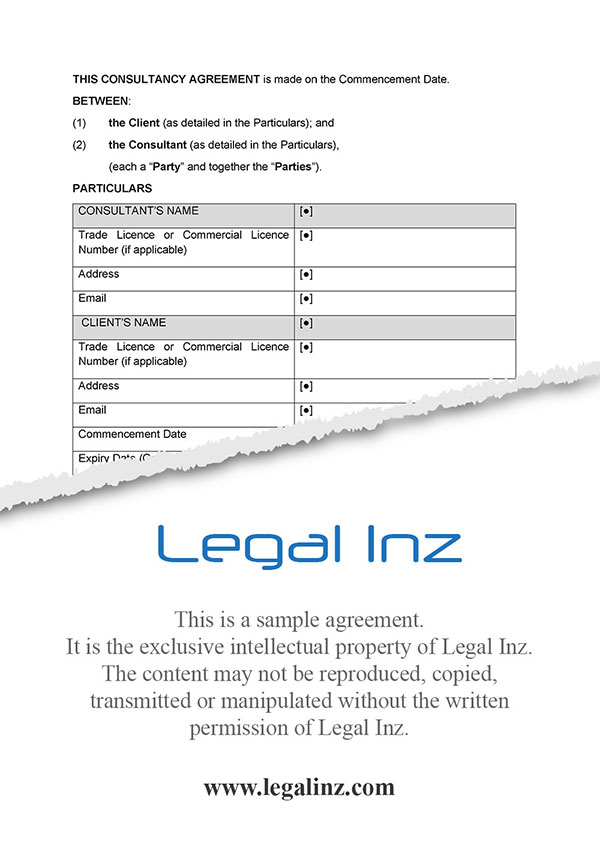A consultancy agreement is a specific type of service agreement wherein a client seeks services of a consultant. A consultant offers his specific services to the client either independently or as part of an entity. A consultancy agreement would typically establish the rights and obligations of both parties and define the scope of consultancy to be rendered in terms of the agreement.
Who is a Consultant?
A consultant is a person, or an entity engaged in providing the consultancy in specific areas where the consultant either is an expert of or holds significant experience in. The services of a consultant usually precede any future act to be undertaken by a client so that the client can make an informed decision by understanding all associated risks and liabilities and/or to assess the profits on a more realistic basis, with his future acts.
Who is a Client?
A client is a party to a consultancy agreement who engages a consultant to seek his services as per the terms of the agreement. The client thus pays the consultant for the services he has rendered to the client as per terms of the agreement.
What are the Most Common Types of Consultancy?
The essence of a consultancy agreement is to engage a consultant who has significant experience in a particular field or in an expert in that area. The most common types of consultants providing unique consultancy are legal consultant, art consultant, business strategy consultant, technical consultant, marketing consultant, real-estate consultant, financial advisory consultant, data analyst, risk management consultant, investment consultant, etc.
Why Having a Consultancy Agreement is Important?
Any party who desires to enter any business relationship or act on a business proposal, should first assess all the pros and cons associated with his acts. This is where a consultant can be very helpful. A consultant can help a client by providing his services of being an expert or an experience holder in the field and allow the client to make a healthy choice in respect of his future acts. Parties, therefore, usually hire a consultant to seek their consultancy on the subject matter to either to seek risk assessment or understand benefits of the business decision they are about to make.
What Does a Consultancy Agreement Cover?
A consultancy agreement can have any terms that the parties may mutually agree. However, a consultancy agreement would usually cover the following:
Personal information with respect to the client and consultant:
- These details are important to define the parties to the consultancy agreement who will engage in the legal relationship created by the agreement.
- These details would generally include the names, addresses, passport nos. and email IDs. If one of the parties to the consultancy agreement is an entity rather than a person, their trade/commercial license should also be included to aptly define the party.
Commencement date of the agreement as well as the expiry date of the agreement:
- Dates are an important aspect in order to determine when will the consultancy be provided to the client by the consultant.
- An agreement should always have a defined starting date.
- An expiry date may be optional as the agreement may define the terms of until the consultancy completes a specific target, it will continue to be in force rather than a specific date of end to the agreement.
Defining service(s):
- Under the agreement, what is nature of consultancy to be rendered under the consultancy agreement is important as it forms the crux of why the parties entered into an agreement in the first place.
- Consultancy should be adequately defined in order to reduce any future issues under the agreement.
Amount of fees and schedule of fees:
- Total amount of fees to be paid in lieu of the consultancy outlines the consideration that the parties have agreed to enter into the agreement.
- Apart from the total amount, the agreement could also outline the schedule of when and what payment is to be made to the consultant under the agreement. These may be subject to specific milestones/ durations to be completed by the consultant.
Respective rights and liabilities of the parties:
- A consultancy agreement should discuss what rights would each party hold under the agreement which would define their position in the agreement and their future implications.
- Consultancy agreement should also aptly define the respective liabilities of each party under the agreement. These are important to hold the other party responsible for their acts under the agreement.
Penalties:
- A consultancy agreement should define consequences of non-performance under the Agreement by either party. These are important since the consequences would outline exactly what a non-defaulting party can seek against the defaulting party.
- A consultancy agreement could thus incorporate penalties in order to act as a deterrent for the other party to not to breach his obligations under the agreement, for consequences of breach of terms of the agreement;
Applicable law for the agreement and jurisdiction:
- This is one of the most important clauses in a consultancy agreement as it defines the law which will govern the agreement as well territorial jurisdiction of any case to be filed, if any, assuming any dispute arises in future.
- These attain even more importance in cases which involve parties from different jurisdictions such as different emirates in UAE or even different countries.
Additional terms:
- A consultancy agreement could incorporate such other additional terms as may be mutually agreed between the parties such as confidentiality, intellectual property rights, warranties, obligations, etc.
- These additional terms define the relationship of the client with the consultant in a more specific way, in order to reduce the chances of any disputes in future.
The objective of different clauses under the agreement is to mitigate the risk associated with any agreement. More streamlined clauses and specifically defined terms in an agreement allows the parties to have confidence that theirs rights are duly protected.
Our online form provides for a range of customisations that cater to all clients on a case-to-case basis. We provide our clients with more freedom and control in terms of what their consultancy agreement should cover. Please see our different packages to see various options available to the clients in terms of personal customisation of their consultancy agreements.







 verified reviews
verified reviews

